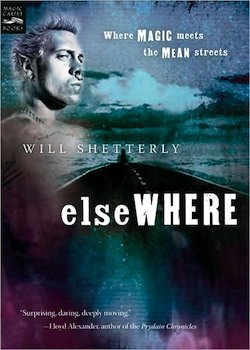Welcome back to the Bordertown reread. On the agenda for the day is the first of the novels set in the shared world of Bordertown, Will Shetterly’s Elsewhere. Elsewhere is the story of Wolfboy, whom we met in “Danceland,” the novella by Shetterly and Emma Bull that opens the anthology Bordertown. Except the Wolfboy we meet in Elsewhere isn’t Wolfboy yet, he’s just Ron, and he’s just made his way across the Border.
Confused now? Excellent. Let’s begin.
“You get a second chance in Bordertown. You should think about what that means, and what you want.” So Mickey, the owner of Elsewhere Books, tells Wolfboy (when Wolfboy is still Ron) on the train into Bordertown. Ron is not particularly good at listening. And he needs a second chance, and a third one, and many others, because he’s really good at saying something wrong, or snarky, or mean at the worst possible moment. We’ve read “Danceland.” We know exactly how much trouble Ron’s mouth gets him into.
Even though I had read Elsewhere previously, I was so used to thinking of Ron as Woflboy, it was jarring to see his past self – and be reminded of how difficult he was to like when he first arrived in Bordertown – on the page. Seeing Wolfboy as Ron was an elegant reminder that, for many of us who go someplace new, hoping to be someone else, we don’t go just because we want other people to like us better. We go someplace new because we hope when we get there, we’ll like ourselves better, too.
But it isn’t just Ron who crosses the Border looking for second chances. A second chance is pretty much why everyone goes to Bordertown, and Elsewhere explores what it means to look for that chance.
Unless you are an elf, simply crossing the Border doesn’t change who you are. (Even with elves, the crossing doesn’t so much change them, as reshape their brains into things that can exist across the Border.) Going to Bordertown in hopes of escaping yourself won’t work. So while some take their second chances and thrive, others squander them. Some fail to see the gift they have been given. Problems from the World and from the Realm don’t disappear when they get to Bordertown, they simply change shape. Addiction is still addiction, grief is still grief, and those who are careless of others are still unseeingly reckless.
Because Elsewhere is a novel, and not a shorter work, the experience of Bordertown in its pages is inherently different from that of the anthologies. We see more parts of the city, but the setting becomes less immediate. What matters is the transformation of the characters, and of Ron in particular.
It’s an important shift in perspective from the anthologies, as what people go to Bordertown for is that chance at transformation, the opportunity to be someone other than the person they were. Bordertown’s transformative potential is one of its greatest – and most dangerous – magics. As Ron says, “I’d always wanted people to see me and know I was special. You do have to be careful what you wish for.”
Ron’s transformation into Wolfboy is perhaps the most physically obvious manifestation of the dangerousness with which Bordertown offers its second chances, but at its heart, Elsewhere is a book about the opportunity to become your true self. Like all true magics, there are consequences for its use, and some people cannot bear the transformation. But for those who can, for those strong enough to risk the consequences, the transformation may be a saving grace. Indeed, in the subplot involving the feral elf-child, Florida, who befriends Ron, Shetterly makes a powerful argument that second chances and transformations are simply acts of grace, by alternate names.
The theme of transformation in Elsewhere foregrounds another commonality in the Bordertown stories: Bordertown is not a place you go if you are looking for a happy ending, either as a reader or as a resident. But it is the place to go if you are looking for the right ending, if you want to learn who you truly are, rather than who you think you ought to be. It’s a perilous journey, one that takes bravery to begin, and you may not recognize yourself at the end of it.
We get so strange when we cross the Border. Ready to go?
Kat Howard‘s short fiction has been published in a variety of venues. You can find her on Twitter, at her blog, and at Fantasy-matters.com. She still wants to live in Bordertown.










